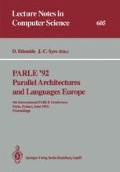Abstract
In previous papers, a new theory for the design of deadlock-free adaptive routing algorithms for wormhole and store-and-forward routing as well as two design methodologies have been proposed. Also, a new adaptive routing algorithm, obtained from the application of the former theory to the binary n-cube, has been evaluated using both, a uniform and an exponential distribution for message destination. The results are good, especially for large networks and a uniform distribution for message destination. When locality is exploited, the results are comparatively worse, mainly due to the reduction in channel bandwidth produced by channel multiplexing. In this paper, we analyse the advantages and disadvantages produced by the use of virtual channels, proposing a new approach to maximize their efficiency. This approach uses time-dependent selection functions, associating a threshold to some virtual channels. Those channels cannot be selected by a message unless it is waiting for longer than the corresponding threshold. The evaluation of the new selection function for the binary n-cube shows an important improvement, especially when locality is exploited.
This work was supported in part by the Spanish CICYT under Grant TIC91-1157-C03-03
Preview
Unable to display preview. Download preview PDF.
References
W.C. Athas and C.L. Seitz, Multicomputers: message-passing concurrent computers, Computer, Vol. 21, No. 8, pp. 9–24, August 1988.
S. Borkar et al., iWarp: an integrated solution to high-speed parallel computing, Supercomputing'88, Kissimmee, Florida, November 1988.
W. Chou, A.W. Bragg and A.A. Nilsson, The need for adaptive routing in the chaotic and unbalanced traffic environment, IEEE Trans. Commun., Vol. COM-29, No. 4, pp. 481–490, April 1981.
E. Chow, H. Madan, J. Peterson, D. Grunwald and D.A. Reed, Hyperswitch network for the hypercube computer, Proc. 15th Int. Symp. Computer Architecture, Honolulu, May–June 1988.
W.J. Dally and C.L. Seitz, The torus routing chip, Distributed Computing, Vol. 1, No. 3, pp. 187–196, October 1986.
W.J. Dally and C.L. Seitz, Deadlock-free message routing in multiprocessor interconnection networks, IEEE Trans. Computers, Vol. C-36, No. 5, pp. 547–553, May 1987.
W.J. Dally, Fine-grain concurrent computers, Proc. 3rd Conf. on Hypercube Concurrent Computers & Applications, Pasadena, California, January 1988.
W.J. Dally, Virtual-channel flow control, Proc. 17th Int. Symp. Computer Architecture, Seattle, Washington, May 1990.
W.J. Dally, Performance analysis of k-ary n-cube interconnection networks, IEEE Trans. Computers, Vol. C-39, No. 6, pp. 775–785, June 1990.
J. Duato, Deadlock-free adaptive routing algorithms for multicomputers, Technique et Science Informatiques, Vol. 10, No. 4, 1991.
J. Duato, On the design of deadlock-free adaptive routing algorithms for multicomputers: theoretical aspects, Proc. 2nd European Distributed Memory Computing Conf., Munich, April 1991.
J. Duato, On the design of deadlock-free adaptive routing algorithms for multicomputers: design methodologies, Proc. Parallel Architectures and Languages Europe 91, Eindhoven, June 1991.
J. Duato, Deadlock-free adaptive routing algorithms for multicomputers: evaluation of a new algorithm, Proc. 3rd IEEE Int. Symp. on Parallel and Distributed Processing, Dallas, December 1991.
J. Duato, Impact of locality on the performance of some adaptive routing algorithms for the hypercube, European Workshop on Parallel Computing 92, Barcelona, March 1992.
C. Germain, Etude des mécanismes de communication pour une machine massivement parallèle: MEGA, Ph.D. dissertation, Université de Paris-Sud, Centre d'Orsay, 1989.
H. Hofestädt, A. Klein and E. Reyzl, Performance benefits from locally adaptive interval routing in dynamically switched interconnection networks, Proc. 2nd European Distributed Memory Computing Conf., Munich, April 1991.
C.R. Jesshope, P.R. Miller and J.T. Yantchev, High performance communications in processor networks, Proc. 16th Int. Symp. Computer Architecture, Jerusalem, Israel, May–June 1989.
C.K. Kim and D.A. Reed, Adaptive packet routing in a hypercube, Proc. 3rd Conf. on Hypercube Concurrent Computers & Applications, Pasadena, California, January 1988.
H.T. Kung, Deadlock avoidance for systolic communication, Proc. 15th Int. Symp. Computer Architecture, Honolulu, May–June 1988.
D.H. Linder and J.C. Harden, An adaptive and fault tolerant wormhole routing strategy for k-ary n-cubes, IEEE Trans. Computers, Vol. C-40, No. 1, pp. 2–12, January 1991.
S. Ragupathy, M.R. Leutze and S.R. Schach, Message routing schemes in a hypercube machine, Proc. 3rd Conf. on Hypercube Concurrent Computers & Applications, Pasadena, California, January 1988.
D.A. Reed and D.C. Grunwald, The performance of multicomputer interconnection networks, Computer, Vol. 20, No. 6, pp. 63–73, June 1987.
D.S. Reeves, E.F. Gehringer and A. Chandiramani, Adaptive routing and deadlock recovery: a simulation study, Proc. 4th Conf. on Hypercube Concurrent Computers & Applications, Monterey, California, March 1989.
Author information
Authors and Affiliations
Editor information
Rights and permissions
Copyright information
© 1992 Springer-Verlag Berlin Heidelberg
About this paper
Cite this paper
Duato, J. (1992). Improving the efficiency of virtual channels with time-dependent selection functions. In: Etiemble, D., Syre, JC. (eds) PARLE '92 Parallel Architectures and Languages Europe. PARLE 1992. Lecture Notes in Computer Science, vol 605. Springer, Berlin, Heidelberg. https://doi.org/10.1007/3-540-55599-4_115
Download citation
DOI: https://doi.org/10.1007/3-540-55599-4_115
Published:
Publisher Name: Springer, Berlin, Heidelberg
Print ISBN: 978-3-540-55599-5
Online ISBN: 978-3-540-47250-6
eBook Packages: Springer Book Archive

